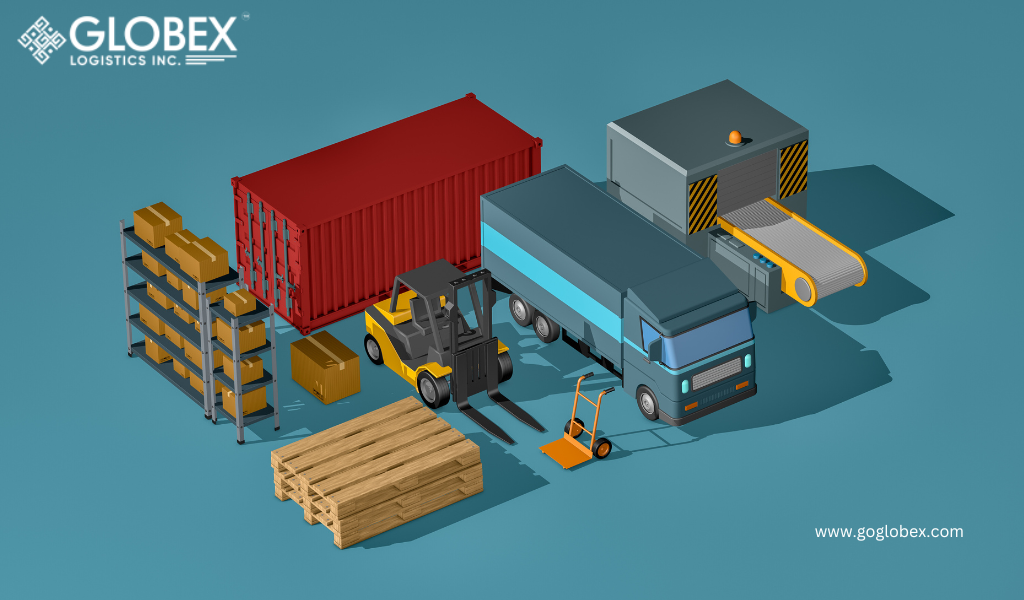
The Importance of Warehousing in Supply Chain Management
Warehousing plays an indispensable role in supply chain management. In today's digital era, we have to satisfy our customers’ needs by fulfilling their demands rapidly and warehousing solutions such as storage, inventory management and goods distribution help to increase the efficiency of supply chain management. Warehousing management systems make sure of cost reduction, fast and efficient order fulfillment, and smooth overall operations.
Role of warehousing solutions in supply chain management—
The role of warehousing shows why it is indispensable in supply chain management. A warehouse is an epicenter that facilitates the distribution process by timely delivery of goods, order fulfillment, storage of cargo, and inventory management. Warehouses help businesses to reduce their operational costs by storing goods and managing seasonal demand fluctuations.
Pivotal Functions of Warehousing
- As a Storage Hub and Inventory Management
The main function of warehousing is to store the goods in the warehouse for a certain time period. The goods can be anything from raw material to the finished products. By storing goods, companies can avoid the delay in order fulfillment and stock shortage, which ultimately helps to meet the customer’s demand.
- Fulfillment Center—
For providing fast and accurate deliveries to the customer, warehouses play an important role in order fulfillment by picking, packing, and shipping products efficiently. Automated order fulfillment processes in warehousing and logistics are an edge that makes businesses more successful.
- Uninterrupted supply chain—
Having a warehousing service in your business is an upper hand for that business. In case of rare and unfortunate incidents like supply chain delays or transportation issues, having stored goods in a warehouse helps to sustain the business. In case of an upsurge in the product demand, the warehousing solution comes to help order fulfillment.
- Add-on Services—
Warehouse can provide some complementary value-added services such as product packaging, labeling, and quality control. These things help businesses to increase their brand credibility.
- Risk Management—
Storing goods in a warehouse reduces the risk of damage, tip inventory loss, etc. A warehousing management system can maintain the climate. We can take the necessary security measures to make sure that goods are in optimal condition.
Benefits Of Warehousing in Supply Chain Management:
- Optimize customer gratification-
A well-organized warehouse management system improves customer satisfaction by on-time order fulfillment and fast deliveries.
- Saving Costs—
Use of automation in warehousing services results in operational cost reduction. Selection of warehouse locations for your business will also help to reduce the logistical cost. Appropriate inventory management and selection of strategy for warehousing and logistics will result in saving expenses.
- Better inventory management-
Digital transformation of warehousing services ensures real-time inventory management, which ultimately helps to track the stock level digitally, decreasing the risk of overstocking and understocking.
- Rapid delivery service-
The location of the warehouse near the key market gives a competitive edge to the business by delivering goods rapidly.
- Helps in business scalability—
Benefits of warehousing services support businesses to grow.
Various Types of Warehouses in Supply Chain Management—
- Private warehouse—
These types of warehouses are business-owned warehouses. Use of such warehouses is limited to their business only, which provides the best control over inventory storage distribution. Private warehouses are the best warehousing solution for businesses that require consistent storage needs.
- Public warehouses—
This type of warehouse provides storage for multiple businesses. Generally, this type of warehouse is managed by a third party. This warehouse solution is very cost-effective for the business that needs inconsistent storage.
- Distribution center—
This warehousing management system ensures rapid order processing, shipping, and delivery. The location of the distribution center is strategically decided, which helps in cost reduction for the business by minimizing transportation time and cost. Distribution centers improve the supply chain management.
- Bonded warehouse—
The imported goods are stored in a bonded warehouse prior to customs clearance. Importers can store the imported goods in a bonded warehouse and can delay the payment of customs duties and taxes, which ultimately helps their business to improve cash flow.
- Smart Warehouse—
The warehouses that use AI, robotics, and automation in their warehousing management systems are called smart warehouses. Use of smart warehouses increases productivity, reduces the chances of errors, and improves overall supply chain management.
FAQs About Warehousing and Logistics-
Why are warehouse services an essential part of supply chain management?
Warehousing and logistics help to store goods, boost the speed of order fulfillment, expedite the delivery system, and manage inventory. Warehousing solutions minimize the wastage, reduce costs, and maintain real-time stock. By seeing all these benefits of warehouse services, it’s proven that a warehouse is an essential part of the supply chain industry.
What are the different types of warehouses?
Private warehouse / Public warehouses / Distribution center / Bonded warehouse / Smart warehouse.
Warehousing services are a crucial part of Supply Chain Management; they make sure of efficient storage, inventory management, and order fulfillment. With the help of automation, robotics, and AI, the warehousing and logistics industry can increase their efficiency and customer satisfaction.
Recent posts
categories




